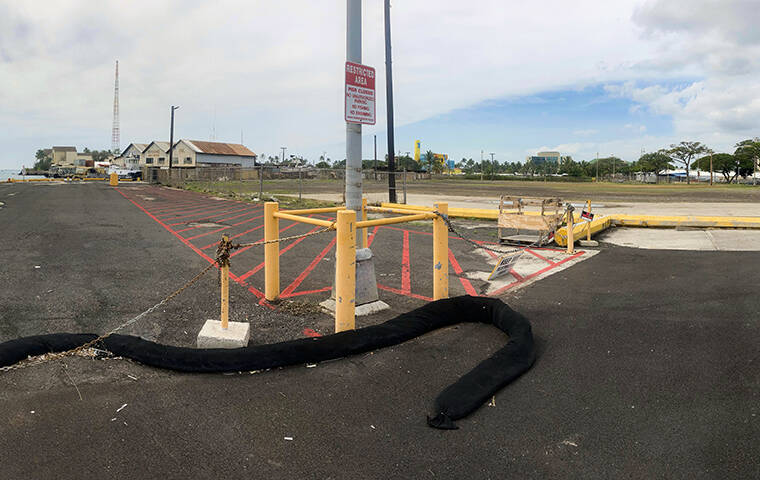Office of Hawaiian Affairs Kakaako Makai bill advances

CRAIG T. KOJIMA / CKOJIMA@STARADVERTISER.COM
The Committee on Hawaiian Affairs voted 4-1 and the Committee on Water and Land voted 5-0 to pass Senate Bill 736 on Thursday. The bill allows residential development of the land in Kakaako owned by the state Office of Hawaiian Affairs. Above, land on the Ewa edge of Kewalo Harbor owned by the agency is seen.
The state Office of Hawaiian Affairs succeeded in advancing a bill to permit residential development on 31 acres it owns in Kakaako Makai past a pair of Senate committees Thursday after a contentious public hearing last week.
The Committee on Hawaiian Affairs voted 4-1 and the Committee on Water and Land voted 5-0 to pass Senate Bill 736, which also would increase height and density limits on three of OHA’s nine parcels in the area and give OHA $65 million to fix a wharf area fronting Kewalo Harbor.
OHA is seeking the changes to enhance the value of the land it received in 2012 from state administrators in lieu of $200 million the state owed OHA for unpaid ceded-land revenue.
The Legislature in 2006 enacted a ban on residential use of land in Kakaako Makai, which stretches from Kewalo Harbor to Honolulu Harbor and includes other landowners as well as a city shoreline park, to block another state agency from having a private developer produce residential towers on one inland block as part of a mixed-use project.
Representatives of OHA, which exists to improve conditions for Native Hawaiians, claim they were misled about the land’s value a decade ago. Now the agency claims the land, which the city values at about $300 million for property tax purposes, is worth far below $100 million.
“Very simply, OHA was shortchanged and needs to be made whole,” Carmen Hulu Lindsey, chair of OHA’s board of trustees, told members of the two committees Thursday.
Don't miss out on what's happening!
Stay in touch with breaking news, as it happens, conveniently in your email inbox. It's FREE!
At a public hearing last week, the committees received 87 written comments opposing and 68 written comments supporting the bill. Much of the opposition has been from members of Save Our Kakaako and Friends of Kewalos organizations and others who demonstrated in 2006 to get the ban imposed as a way to block private use of public land and have public amenities produced in the area instead.
Lindsey said OHA intends to have housing developed on only three of its nine parcels — all inland, including two fronting Ala Moana Boulevard — but endorsed the bill allowing residential development on all nine for “simplicity and legal clarity.”
OHA CEO Casey Brown previously said in an interview that ideally, OHA would like all land-use options for all of its Kakaako Makai land and that residential development would be pursued only on parcels that made sense.
Several members of the two committees agreed that OHA had been shortchanged in its 2012 settlement based on the agency’s contention that an appraisal it commissioned at the time was done in haste and didn’t adequately assess land conditions including deferred maintenance and costs to remediate contamination on the man-made peninsula, which was created in part using residue from incinerated trash. A new appraisal, which OHA has not publicly shared, is the basis of the new value “way under” $100 million.
Sen. Lorraine Inouye, one of the bill’s introducers and chair of the Water and Land committee, called OHA’s conceptual plan, which includes 10 acres of open space, a great plan.
“It’s a sad situation,” said Inouye (D, Hilo-Pepeekeo). “I think OHA has been shortchanged.”
Some other committee members said they feel the same way.
“The Native Hawaiian community deserves more,” said Sen. Angus McKelvey (D, West Maui-Maalaea-South Maui).
To reduce some concerns over the proposed height increase to 400 feet from 200 feet on three parcels OHA has identified for residential use, the bill was amended with a 350-foot limit. Still, a couple of committee members still voted with reservations to pass the measure.
A couple of committee members, Sen. Kurt Fevella (R, Ewa Beach-Ocean Pointe- Iroquois Point) and Sen. Les Ihara Jr. (D, Palolo- Kaimuki-Moiliili), said OHA was shortchanged but that swapping the Kakaako Makai land with land elsewhere could make up for that. Fevella suggested land around Aloha Stadium. Ihara was the lone no vote on SB 736.
The bill’s next referral is to another pair of Senate committees, the Judiciary Committee and the Ways and Means Committee.
Three other bills also were introduced this year to lift the residential development prohibition on some or all of OHA’s Kakaako Makai land, though none of those other bills have been scheduled for a hearing.
If SB 736 clears the Senate, it is expected to face a tougher hurdle in the House of Representatives, where House Speaker Scott Saiki has previously opposed lifting the 2006 ban and recently suggested possibly reopening the settlement agreement.




